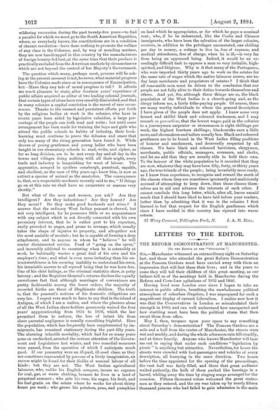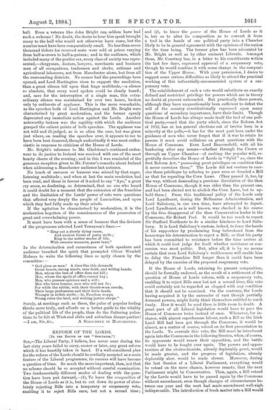LETTERS TO THE EDITOR.
THE REFORM DEMONSTRATION AT MANCHESTER..
[To THE EDITOR OF THE "SPECTATOR.']
Slit,—Manchester witnessed an extraordinary sight on Saturday last, and those who attended the great Reform Demonstration at the Pomona Gardens must have carried away with them an impression that will last them their lives ; and in the years to come they will tell their children of this great meeting, as our fathers tell us of the meetings held in Manchester during the Reform and Corn-Law agitations of 1832 and 1846.
Having lived near London ever since I began to take an. interest in public affairs, breathing the unwholesome political atmosphere of suburban Jingoism, I was unprepared for such a magnificent display of earnest Liberalism. I realise now how it was that the Conservatives in London so miscalculated their strength in 1880, and can well understand how unexpected and how startling must have been the political storm that then. swept them from office.
May I, then, trespass upon your space to say something, about Saturday's demonstration ? The Pomona Gardens are a mile and a half from the centre of Manchester, the streets were wet and muddy, and during the whole afternoon rain fell steadily,. and at times heavily. .Anyone who knows Manchester will bear me out in saying that under such conditions "legislation by picnic" is anything but attractive. Nevertheless, for hours the. streets were crowded with foot-passengers and vehicles of every description, all hurrying in the same direction. Two hours before the time appointed for the opening of the proceedings,. the vast hall was fairly filled, and there that great audience waited patiently, the bulk of them packed like herrings in a barrel, whiling away the time by singing songs arranged for the occasion. Fifteen thousand voices welcomed the great states- men as they entered, and the cry was taken up by nearly fifteen thousand persons who had failed to gain admission to the main_ hall. Even a veteran like John Bright can seldom have had such a welcome ! No doubt, the desire to hear him speak brought many to the hall who would not otherwise have come, but the number must have been comparatively small. No less than seven thousand tickets for reserved seats were sold at prices varying from half-a-crown to half-a-guinea; and in the audience, which included many of the gentler sex, every class of society was repre- sented,—clergymen, doctors, lawyers, merchants and business men of all occupations, tradesmen and clerks, artisans and agricultural labourers, not from Manchester alone, but from all the surrounding districts. No sooner had the proceedings been opened, and Lord Hartington risen to support the resolution, than a great silence fell upon that huge multitude,—a silence so absolute, that every word spoken could be clearly heard ; and, save for the interruption of a single man, this extra- ordinary silence was maintained for over two hours, broken only by outbursts of applause. This is the more remarkable, as the speeches both of Lord Hartington and Mr. Bright were characterised by great moderation, and the former openly deprecated any immediate action against the Lords. Another noteworthy feature was the rapidity with which the audience grasped the salient points of both speeches. The applause was not wild and ill-judged, as is so often the case, but was given just where, on reading the speeches over, it appears to me to have been best deserved, though undoubtedly it was most enthu- siastic in response to criticism of the House of Lords.
Mr. Bright's reference to Mr. Gladstone's continued endea- vour to do justice to Ireland was received with one of the most hearty cheers of the evening ; and in this I was reminded of the generous reception given to Mr. Forster's remarks about Ireland when addressing a Manchester audience last autumn.
No touch of sarcasm or humour was missed by that eager, listening multitude ; and when at last the main resolution had been read, and those in favour of it asked to say "Aye," a great cry arose, so deafening, so determined, that no one who heard it could doubt for a moment that the extension of the franchise and the limitation of the Lords' power of veto were questions that affected very deeply the people of Lancashire, and upon which they had fully made up their minds.
If the agitation be characterised by moderation, it is the moderation begotten of the consciousness of the possession of great and overwhelming power.
It must have been with a sense of humour that the devisers of the programme selected Lord Tennyson's lines :—
"Ring out a slowly dying cause,
And ancient forms of party strife ; Ring in the nobler modes of life, With sweeter manners, purer laws."
In the determination and earnestness of both speakers and audience breathed the spirit that prompted Oliver Wendell Holmes to write the following lines so aptly chosen by the committee:—
"God gives us men ! A time like this demands
Great hearts, strong minds, true faith, and willing hands.
Men, whom the lust of office does not kill ;
Men, whom the spoils of office cannot buy ;
Men, who possess opinions and a will ; Men who have honour, men who will not lie; For while the rabble, with their thumb-worn creeds, Their large professions and their little deeds, Wrangle in selfish strife,—lo, Freedom weeps,
Wrong roles the land, and waiting justice sleeps."
Surely, at meetings such as these, the pulse of popular feeling throbs more truly, and affords us a better guide to the vitality of the political life of the people, than do the fluttering pulsa- tions to be felt at West-end clubs and suburban dinner-parties!
—I am, Sir, &c., A SOJOURNER IN MANCHESTER.



































 Previous page
Previous page